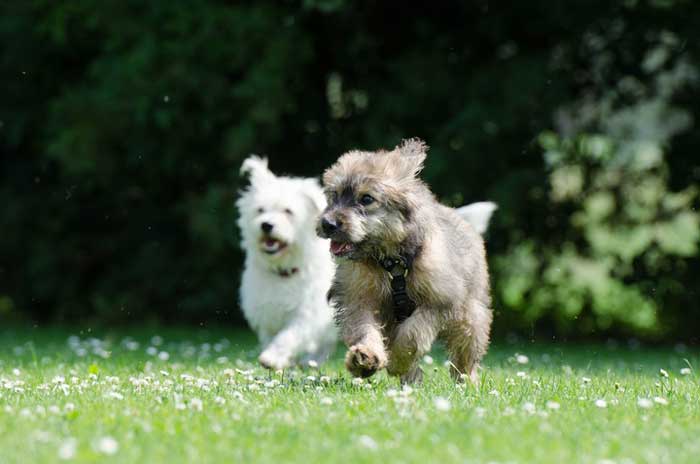If your pet companion is past the puppy socialization window, it’ll take a little bit of hard work on your part in order for your dog to feel comfortable when out and about.
While it’s never too late to socialize your mature dog, it’s important to know that going about it is going to be quite different from going about socializing a puppy.
This article attempts to help you understand dog socialization, why it’s vital, and how you can go about socializing an older dog.
What Is Dog Socialization?
The concept of socialization for dogs is quite similar to that of humans. Think about it this way, if you’ve gone about most of your childhood years without socializing with others, it’s possible that you’ll find it hard to relate to others when you’re older, which will take a toll on your social life.
Similarly, if puppies aren’t trained to develop their social skills with other people and dogs, it’s going to be difficult for them to behave as they should when put in social situations. With that said, dog socialization is simply the practice of getting your dog accustomed to other people and pets.
The process of dog socialization involves having your canine friend spend time with new groups of people, including children. Moreover, you have to get your dog used to other dogs so that they don’t display signs of either fear or aggression around a new dog.
Ideally, dog socialization should take place during the initial months of a puppy’s life, which isn’t as daunting of a task as socializing an older dog. Despite the reasons behind your pet’s lack of social skills, you should know that socializing an adult dog is different from socializing a puppy.
Why Is It Important to Socialize Your Dog?
- Unhealthy Hormones – Adult dogs that aren’t socialized properly tend to fear new situations, and the feeling of fear sets off neurological signals that result in the release of unhealthy hormones. Consequently, poorly-socialized dogs often experience stress-related health conditions. Such hormones include corticosteroids and adrenaline hormones.
- Poor Grooming – There are certain breeds of dogs that require detailed grooming on a regular basis in order to sustain proper fur and skin health. However, trying to groom an uneven-keeled dog that suffers from poor social skills can be quite challenging and may require forceful restraint, which may end up accidentally injuring the poor thing.
- Strenuous Physical Examination – If your poorly-socialized dog is suffering from some sort of illness, veterinarian examination will be needed. However, a poorly-socialized pet with a triggered feeling of fear may respond to a physical exam with aggression and that can make it extremely hard for your veterinarian to carry out the examination smoothly.
- Exercise Deficiency – Taking your poorly-socialized dog out on a walk isn’t always that good of an idea due to the possibility of your dog engaging another dog, people and other pets. But at the same time, dogs that don’t get adequate physical exercise tend to be prone to health conditions that are associated with obesity.
Signs of an Under Socialized Dog
A dog’s general behavior relies heavily on two main factors: genetics and experience. However, the following are behaviors that the vast majority of poorly-socialized dogs tend to display:
- General fearfulness or aggression around people and dogs
- Over excitation or defensive reactivity towards stressful situations
- Nervousness or shyness when around other people or on a walk
- Stressed body language when approached by another individual or animal
- Avoidance behaviors during the sounding of unexpected sounds
- Fear and lack of interest as far as embarking on new adventures
Best Time to Socialize Your Dog

The most appropriate age to introduce your dog to new experienced is between 3 weeks and 4 months old. This is the period of a dog’s life when it doesn’t mind doing just about anything. From week 12 to week 18 of a puppy’s life, the window of socialization begins to diminish slowly.
After the conclusion of the 4-month window of socialization, it becomes harder and harder to get your pet to embark on new adventures or socialize with other people and dogs, if not impossible. If you’re adopting a new dog, help it develop its social skills during the first 4 months of its life.
Critical Socialization Period in Dogs
The critical socialization period for dogs (3-18 weeks) is a little more forgiving than that of felines (2-7 weeks), so make sure that you take advantage of that specific period of a dog’s life to teach it the experiences that will later influence its behavior in a positive way.
Benefits of Puppy Socialization
- Well-socialized dogs are a lot easier to groom and handle
- Social canines tend to fancy more playtime and adventure
- Feelings of anxiety and fear aren’t amplified in social dogs
- Well-socialized dogs are less likely to escape their homes
- Veterinarian exams are easily carried out on social canines
Is It Ever Too Late to Socialize My Dog?
No, it’s never too late for your dog to learn proper socializing skills. However, it’s going to need a lot of patience and practice in order to get adult dogs acclimated to social circumstances. It’s also going to require a lot of dog food treats as a way of rewarding your dog for being a good boy.
We feel the need to stress that the longer you wait to teach your dog how to socialize with other people and dogs, the harder it becomes. So if your four-legged companion isn’t socialized within the critical socialization period of dogs, we highly suggest that you start today, if possible.
How to Socialize an Adult Dog

- Daily Walks – One of the best ways you can go about socializing an older dog is to take it on frequent walks on a leash. On a walk, a dog will get to experience new things and see different people and dogs. If your dog happens to act in a displeasing way, simply move in another direction away from the place, people, or situation that agitated your four-legged friend.
- Remain Calm – When around your dog, you want to make sure that you maintain a calm and collected demeanor. Your dog can actually sense how you feel, so if you’re feeling a little stressed, anxious, or nervous, your dog will share these same feelings. If you notice that your dog is nervous or fearful, try to comfort them with your own inner serenity.
- Invite Friends Over – To get your dog acclimated to seeing new people without reacting in a nervous or aggressive manner, invite some of your friends or family members over to your house. Keep your friends within an approachable distance from your dog, but don’t permit them to get any close to the dog. You want to give your dog the opportunity to become familiar with unknown people and allow your dog to be the one approaching your guests.
- Visit a Dog Park – You want to take your anti-social dog for walks around your local dog park, but not inside the park just yet. If your pet behaves well during your walks, you can then transition into taking it for a walk inside the dog park where it can watch and interact with other people and dogs, which will give your dog a positive experience and help develop its social skills.
- Professional Training – If the above-mentioned approaches aren’t showing any promise at all, we advise you to get in contact with a professional dog trainer who uses positive reinforcement.
- Doggie Daycare – Taking your dog to your local dog daycare can help improve its social skills dramatically. Getting an adult dog to socialize requires repetition and patience, so don’t give up too easily.
Final Thoughts
It’s never too late to teach an old dog new tricks, it’s just that the process will require more effort and patience on your part than it would’ve taken to socialize a young pup.
By getting your pet to be more social, you help ensure it lives a happy life that’s full of adventure and new faces. If you have any questions with regard to today’s topic, please feel free to let me know.
Resources
- 7 Dangers of Not Socializing Your Dog from PETMD

